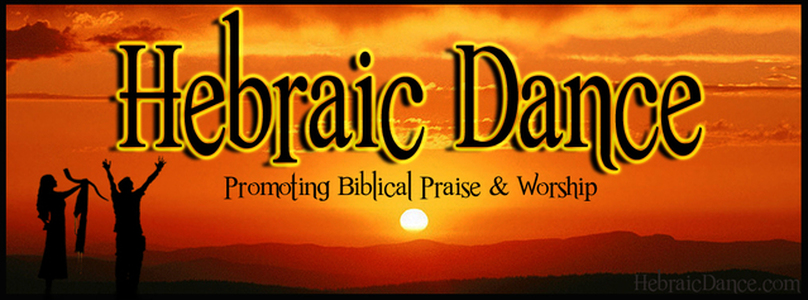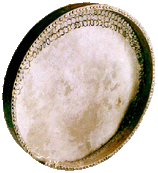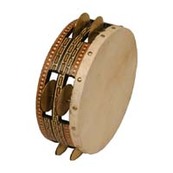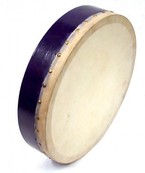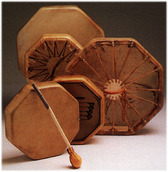Information about the Biblical Tabret ?
The Hebrew word pronounced tofe is variously translated as either tabret, timbrel or tambourine - the King James Version uses both tabret and timbrel. The English "tabret" is derived from an Old French and Spanish word, tabor (or tabour), which was a small hand-held drum, often highly-ornamented, beaten with a single stick, and usually played in accompaniment to one or more of singing and string or wind instruments. That definition agrees with the usual Biblical references to a "tabret" e.g.
Yahweh himself created the tabret in the beginning as an adornment of worship, praise, and glory. We carry these instruments of worship to praise and magnify Yahweh as well .
Although the word Tabret has been changed in most Biblical translations to "timbrel" or "tambourine," Some bible translations still refers to these instruments of worship as "tabrets." The words tabret and timbrel are quite Biblical and are mentioned several times in the Tanakh .Tabret is considered an archaic term according to Modern day translators.In the King James Version Tabret is used,yet all other translations have used timbrel and tambourine which are similar but not the same.
1. A tabret is a small tabor.
2. A tabor is a small drum with one head.
3. A taboret is a small tabor which consists of a small seat without an arm or backing as well as a small frame for holding material while being upholstered.
4. A tabour is a drum; it consists of a circular frame of two hoops fitting withing one another in which a cloth is stretched.
5. A taboret is a strong material with stripes.
Yahweh himself created the tabret in the beginning as an adornment of worship, praise, and glory. We carry these instruments of worship to praise and magnify Yahweh as well .
Although the word Tabret has been changed in most Biblical translations to "timbrel" or "tambourine," Some bible translations still refers to these instruments of worship as "tabrets." The words tabret and timbrel are quite Biblical and are mentioned several times in the Tanakh .Tabret is considered an archaic term according to Modern day translators.In the King James Version Tabret is used,yet all other translations have used timbrel and tambourine which are similar but not the same.
1. A tabret is a small tabor.
2. A tabor is a small drum with one head.
3. A taboret is a small tabor which consists of a small seat without an arm or backing as well as a small frame for holding material while being upholstered.
4. A tabour is a drum; it consists of a circular frame of two hoops fitting withing one another in which a cloth is stretched.
5. A taboret is a strong material with stripes.
The instruments below are all different typos of Middle Eastern Frame Drums
Tabret, Tabor or Tabour: These are all small drums with skin or fabric stretched across. Like a tambourine without jingles (except for the Riq which does have over sized jingles). Or a circular frame with 2 hoops on fitting inside the other. All hand drums pictured above are examples of Frame Drums or Tabour similar to those that would have been use in Ancient Biblical times
Scriptures about the Tabret
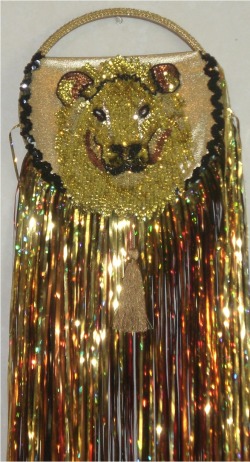
According to the Ancient Hebrew Lexicon
Toph
H8596
Strongs #8596: AHLB#: 1500-J (N)
Tambourine: [freq. 17] |kjv: timbrel, tabret| {str: 8596}
The original form of the tabret was a one sided drum.
Scriptures
Gen 31:27 "Why did you flee secretly and deceive me, and not inform me, and I would have sent you away with joy and songs, with tambourine and lyre?
Exo 15:20 And Miryam the prophetess, the sister of Aharon, took the timbrel in her hand. And all the women went out after her with timbrels and with dances.
Jdg 11:34 And Yiphtaḥ came to his house at Mitspah, and saw his daughter coming out to meet him with timbrels and dancing. Now except for her he had neither son nor daughter.
1Sa 10:5 "After that go to the hill of Elohim where the Philistine watch-post is. And it shall be, when you have come there to the city, that you shall meet a group of prophets coming down from the high place with a stringed instrument, and a tambourine, and a flute, and a lyre before them, and they are prophesying.
1Sa 18:6 And it came to be, as they came in, as Dawiḏ was returning from smiting the Philistine, that the women came out from all the cities of Yisra’ĕl, singing and dancing, to meet Sha’ul the sovereign with tambourines, with joy, and with musical instruments.
2Sa 6:5 And Dawiḏ and all the house of Yisra’ĕl were dancing before יהוה, with all instruments of fir wood, and with lyres, and with harps, and with tambourines, and with sistrums, and with cymbals.
1Ch 13:8 And Dawiḏ and all Yisra’ĕl were playing before Elohim with all their might, and with songs, and with lyres, and with harps, and with tambourines, and with cymbals, and with trumpets.
Job 21:12 They sing to the tambourine and lyre, and rejoice to the sound of the flute.
Psa 68:25 The singers went in front, The players on instruments after them; Among them were the maidens playing tambourines.
Psa 149:3 Let them praise His Name in a dance; Let them sing praises to Him with the tambourine and lyre.
Psa 150:4 Praise Him with tambourine and dance; Praise Him with stringed instruments and flutes!
Isa 5:12 And the lyre and the harp, the tambourine and flute, and wine are in their feasts; but they do not regard the deeds of יהוה, nor see the work of His hands.
Isa 24:8 The joy of the tambourine shall cease, the noise of those who rejoice shall end, the joy of the lyre shall cease.
Isa 30:32 And every passage of the ordained staff which יהוה lays on him, shall be with tabrets and lyres, when He shall fight with it, battling with a brandishing arm.
Jer 31:4 "I am going to build you again. And you shall be rebuilt, O maiden of Yisra’ĕl! Again you shall take up your tambourines, and go forth in the dances of those who rejoice.
KJV
Eze 28:13 Thou hast beenH1961 in EdenH5731 the gardenH1588 of God;H430 everyH3605 preciousH3368 stoneH68was thy covering,H4540 the sardius,H124 topaz,H6357 and the diamond,H3095 the beryl,H8658 the onyx,H7718 and the jasper,H3471 the sapphire,H5601 the emerald,H5306 and the carbuncle,H1304 and gold:H2091 the workmanshipH4399 of thy tabretsH8596 and of thy pipesH5345 was preparedH3559 in thee in the dayH3117 that thou wast created.H1254
Per Wiki-
Timbrel or tabret (the tof of the ancient Hebrews, the deff of Islam, the adufe of the Moors of Spain), the principal musical instrument of percussion of the Israelites, similar to the modern tambourine. The word timbrel is used in the Old Testament in both singular and plural form, so as to suggest that the former referred to a hoop of wood or metal over which was stretched a parchment head; while the plural was perhaps used to designate the tambourine with bells or jangles fixed at intervals in hoops. In Nahum 2:7, where the word "tabering" occurs, it means beating on the breast, as drummers beat on the tabret. The Israelites learned to use the timbrel during their sojourn in Egypt, and it has been suggested that as the Egyptians used it to scare away their evil spirit Typhon, the word tof is derived from the latter. The tabret or timbrel was a favorite instrument of the women, and was used with dances, as by Miriam, to accompany songs of victory, or with the harp at banquets and processions; it was one of the instruments used by King David and his musicians when he danced before the Ark of the Covenant. It was also used in the valley of Hinnom at the sacrificial rites.
Toph
H8596
Strongs #8596: AHLB#: 1500-J (N)
Tambourine: [freq. 17] |kjv: timbrel, tabret| {str: 8596}
The original form of the tabret was a one sided drum.
Scriptures
Gen 31:27 "Why did you flee secretly and deceive me, and not inform me, and I would have sent you away with joy and songs, with tambourine and lyre?
Exo 15:20 And Miryam the prophetess, the sister of Aharon, took the timbrel in her hand. And all the women went out after her with timbrels and with dances.
Jdg 11:34 And Yiphtaḥ came to his house at Mitspah, and saw his daughter coming out to meet him with timbrels and dancing. Now except for her he had neither son nor daughter.
1Sa 10:5 "After that go to the hill of Elohim where the Philistine watch-post is. And it shall be, when you have come there to the city, that you shall meet a group of prophets coming down from the high place with a stringed instrument, and a tambourine, and a flute, and a lyre before them, and they are prophesying.
1Sa 18:6 And it came to be, as they came in, as Dawiḏ was returning from smiting the Philistine, that the women came out from all the cities of Yisra’ĕl, singing and dancing, to meet Sha’ul the sovereign with tambourines, with joy, and with musical instruments.
2Sa 6:5 And Dawiḏ and all the house of Yisra’ĕl were dancing before יהוה, with all instruments of fir wood, and with lyres, and with harps, and with tambourines, and with sistrums, and with cymbals.
1Ch 13:8 And Dawiḏ and all Yisra’ĕl were playing before Elohim with all their might, and with songs, and with lyres, and with harps, and with tambourines, and with cymbals, and with trumpets.
Job 21:12 They sing to the tambourine and lyre, and rejoice to the sound of the flute.
Psa 68:25 The singers went in front, The players on instruments after them; Among them were the maidens playing tambourines.
Psa 149:3 Let them praise His Name in a dance; Let them sing praises to Him with the tambourine and lyre.
Psa 150:4 Praise Him with tambourine and dance; Praise Him with stringed instruments and flutes!
Isa 5:12 And the lyre and the harp, the tambourine and flute, and wine are in their feasts; but they do not regard the deeds of יהוה, nor see the work of His hands.
Isa 24:8 The joy of the tambourine shall cease, the noise of those who rejoice shall end, the joy of the lyre shall cease.
Isa 30:32 And every passage of the ordained staff which יהוה lays on him, shall be with tabrets and lyres, when He shall fight with it, battling with a brandishing arm.
Jer 31:4 "I am going to build you again. And you shall be rebuilt, O maiden of Yisra’ĕl! Again you shall take up your tambourines, and go forth in the dances of those who rejoice.
KJV
Eze 28:13 Thou hast beenH1961 in EdenH5731 the gardenH1588 of God;H430 everyH3605 preciousH3368 stoneH68was thy covering,H4540 the sardius,H124 topaz,H6357 and the diamond,H3095 the beryl,H8658 the onyx,H7718 and the jasper,H3471 the sapphire,H5601 the emerald,H5306 and the carbuncle,H1304 and gold:H2091 the workmanshipH4399 of thy tabretsH8596 and of thy pipesH5345 was preparedH3559 in thee in the dayH3117 that thou wast created.H1254
Per Wiki-
Timbrel or tabret (the tof of the ancient Hebrews, the deff of Islam, the adufe of the Moors of Spain), the principal musical instrument of percussion of the Israelites, similar to the modern tambourine. The word timbrel is used in the Old Testament in both singular and plural form, so as to suggest that the former referred to a hoop of wood or metal over which was stretched a parchment head; while the plural was perhaps used to designate the tambourine with bells or jangles fixed at intervals in hoops. In Nahum 2:7, where the word "tabering" occurs, it means beating on the breast, as drummers beat on the tabret. The Israelites learned to use the timbrel during their sojourn in Egypt, and it has been suggested that as the Egyptians used it to scare away their evil spirit Typhon, the word tof is derived from the latter. The tabret or timbrel was a favorite instrument of the women, and was used with dances, as by Miriam, to accompany songs of victory, or with the harp at banquets and processions; it was one of the instruments used by King David and his musicians when he danced before the Ark of the Covenant. It was also used in the valley of Hinnom at the sacrificial rites.

